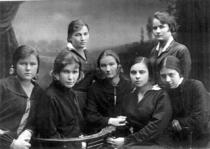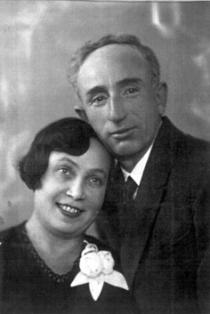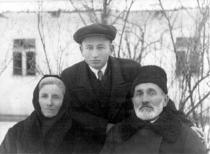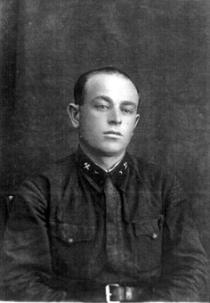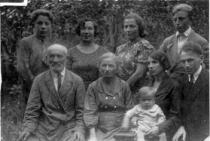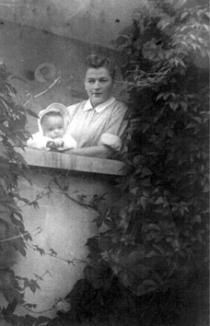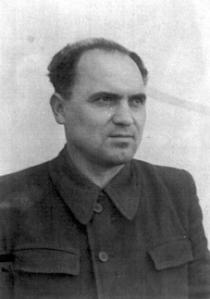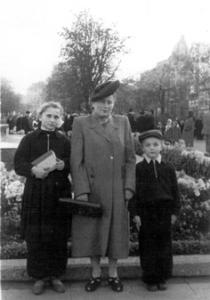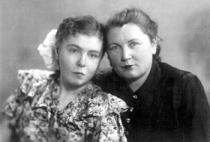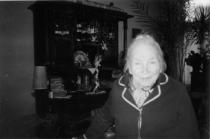Sitting mother Dora and father Srul Ratzenmar, standing my younger brother Fima Rotzenmar when he was a student and came for a winter vacation in 1938. Photo made in Kamenka.
My father, the older son of my grandfather Itzyk, was born in 1880. He finished cheder and then followed in his father's footsteps that was traditional for Jewish families. My father went to work when he turned 11. He also followed into his father's footsteps. They often got so many fruit that they didn't manage to sell all of them, in which case the family made jam in huge bowls that were installed on a brick stand in the garden and fire made underneath. My father also sold jam at the markets in Kamenka and nearby towns, but some of it was left for the family. There was so much of it that we really got sick of this jam.
My mother was born in 1886. My mother was the nicest and the most beautiful woman in the world. She was a wonderful housewife. She was very inventive at cooking that was not so easy considering the kashrut requirements. My mother was an educated woman by the standards of our town. She could read and write in Yiddish.
My parents dated for few years before they had a Jewish wedding with a huppah under apple trees in the orchard, with a rabbi and kleizmers. The wedding party with many guests lasted for few days. There is all I know about their wedding.
We didn't have a house of our own (we couldn't afford to build one) - every year we moved from one house to another. In those years when my father had a rich harvest and managed to sell fruit and jam well our family used to rent a small apartment, but when there were no crops we had to stay in poor houses and sometimes we even had to live in just one room. We usually rented houses from people that leased their gardens to us.
My father was a religious man and followed all traditions very strictly. He knew all prayers and knew which section from Torah had to be read on each Shabbat and which on holidays. My father was a very hardworking man, but he took his rest on Saturday according to the rules. On Saturday we were not allowed even to strike a match. There was a non-Jewish man that came to do all necessary work on Saturday. We were a poor family. My father couldn't afford to pay for a seat of his own at the synagogue, but he went to the synagogue on holidays and every Shabbat. We were a close family. We obeyed our father and mother and treated them with respect. We spoke Yiddish at home and celebrated all Jewish holidays.
My parents stayed in Kamenka in 1941. They didn't believe that Germans could be so cruel. There were German colonies near Kamenka where my father often rented orchards and there were no problems or conflicts with Germans. And my parents stayed at home. Later people told me that Germans convoyed a march of Jews and my father and mother were there. They told me my father fell and a German soldier shot him. My mother bent over my father and screamed and that German shot her, too.
My younger brother Fima, born in 1919, followed into his brother's Michael steps and became a glass specialist, too. He graduated from an Institute in Leningrad. He worked with Michael in evacuation at a military plant in Cheliabinsk. After the war Fima worked at big industrial enterprises. Now he lives in Israel with his family.

